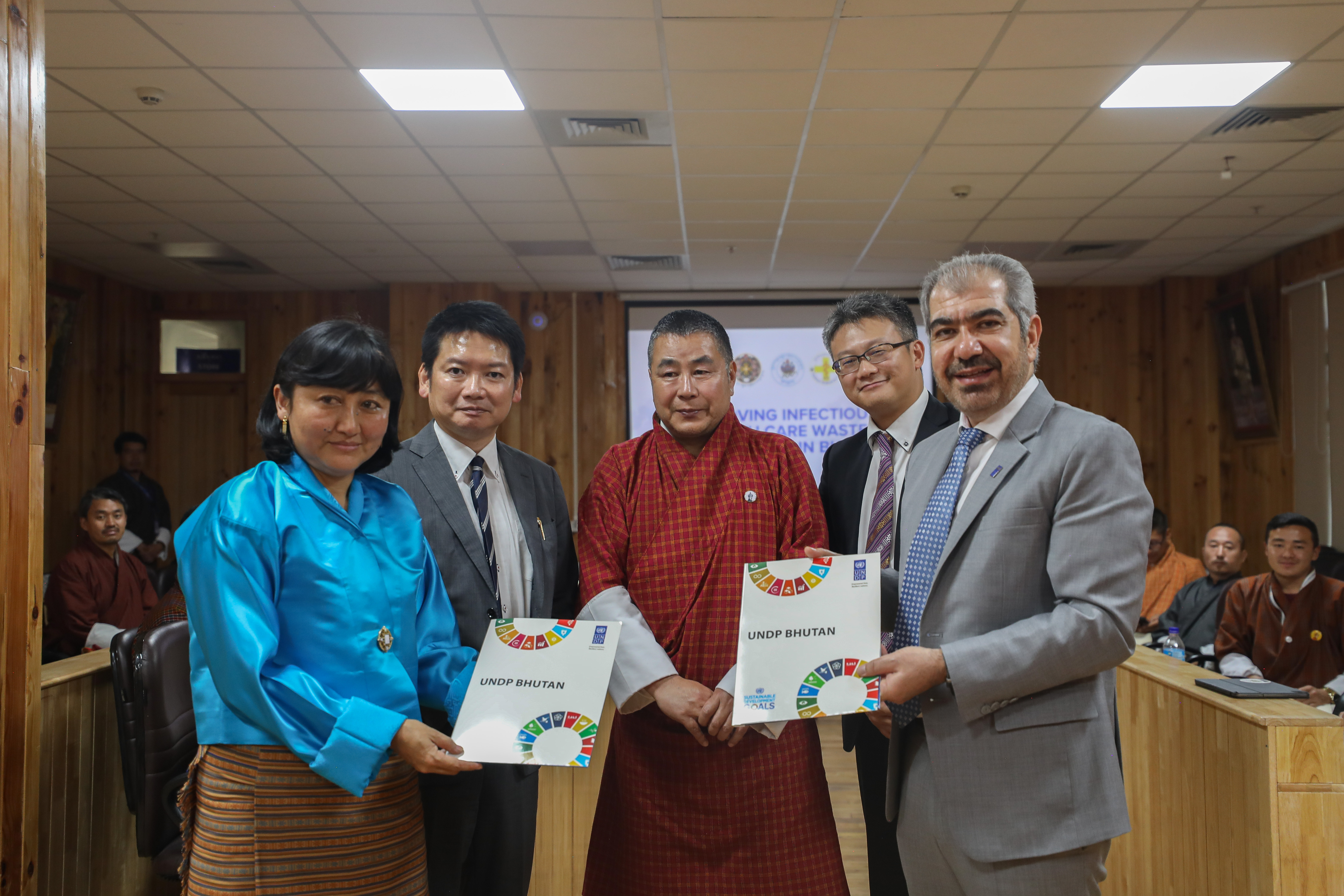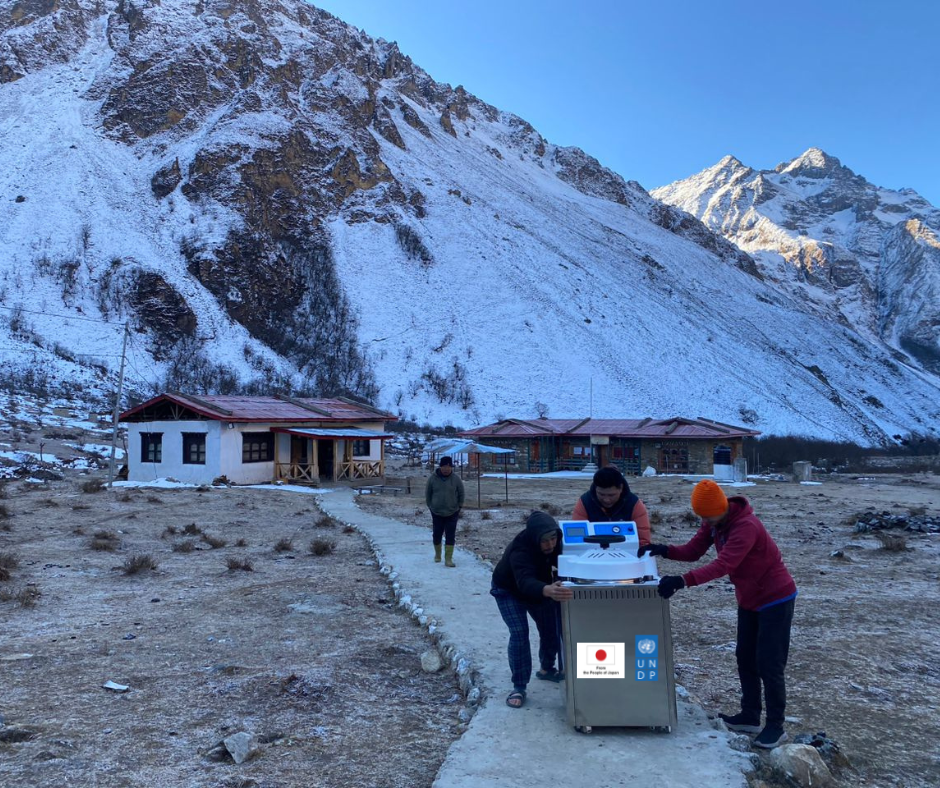Japan and UNDP support 5 specialized medical waste collection trucks for health ministry
June 5, 2024

Japan and UNDP support 5 specialized medical waste collection trucks for health ministry
5 June 2024: The Government of Japan and UNDP handed over five specialized medical waste collection trucks to the Ministry of Health today. The trucks will be deployed at the National Referral Hospital in Thimphu, and municipalities of Gelephu, Wangdue Phodrang, Mongar and Phuntsholing. Through enabling timely collection and disposal, the trucks will contribute towards promoting safe and efficient management of health care waste.

Dr. Mimi Lhamu, President of the National Medical Service (left), Yamashita Hiroyuki, First Secretary, Economic Section, Embassy of Japan (second), Lyonpo Tandin Wangchuk, Minister for Health (centre), Shun Hosaka Second Secretary, Economic Section, Embassy of Japan, Mohammad Younus, UNDP Resident Representative (right)
The handover event was attended by Lyonpo Tandin Wangchuk, Minister for Health, Dr. Mimi Lhamu, President of the National Medical Services, Yamashita Hiroyuki and Shun Hosaka, First and Second Secretaries, Economic Section, Embassy of Japan, UNDP Resident Representative Mohammad Younus, and officials from the Ministry of Health amongst others.

Lyonpo Tandin Wangchuk, Minister for Health addressing the importance of health care waste management
The trucks were supported through the “Project for Improvement of Infectious Waste Management” implemented by the National Medical Services, Ministry of Health in partnership with UNDP and funding from the Government of Japan. The USD 2 million project is the latest in a series of Bhutan-Japan-UNDP partnerships aimed at augmenting the country’s efforts to build a resilient health system following the COVID-19 pandemic.
“Heath care waste management is a crucial component of a sound health care delivery system. During the peak of the COVID-19 pandemic, Bhutan generated almost 8 tonnes of medical waste and we continue to generate more given the consistent increase in the scope of healthcare service delivery. Therefore, it is not only timely but of significant importance to establish an efficient transportation system for collection and safe disposal of medical waste,” said Lyonpo Tandin Wangchuk.

UNDP Resident Representative Mohammad Younus addressing on the importance of building a resilient health system
"This project marks another significant milestone in the Bhutan-Japan-UNDP partnership," said UNDP Resident Representative Mohammad Younus. "Improperly managed health care waste not only poses threat to human health but also that of the environment. This partnership delivered tangible results, contributing significantly towards the Ministry of Health's efforts to put in place sustainable solutions for safe treatment, transportation and disposal of infectious health care waste management, critical for building a resilient health system."

Yamashita Hiroyuki, First Secretary, Economic Section, Embassy of Japan
Yamashita Hiroyuki, First Secretary, Economic Section, Embassy of Japan thanked the Royal Government of Bhutan and UNDP for their collaboration and commitment to improving medical waste management in Bhutan.
“The impact of this project extends beyond the immediate benefits of improved healthcare waste management. It symbolizes the enduring friendship and cooperation between Bhutan and Japan. We are committed to supporting Bhutan in its journey towards sustainable development and improved public health,” said First Secretary Yamashita Hiroyuki.

The health care centre is Soe, Paro is one of the 112 hospitals equipped with autoclaves. Soe is a remote highland community and lies over 4,000 metres above sea level. The autoclaves were airlifted to ensure no remote communities are left behind.
The project has also supported waste shredders for 15 health centers and 99 CCTVs for four municipalities to monitor improper disposal of the waste.

The health care centre is Soe, Paro is one of the hospitals 112 health centres equipped with autoclaves. Soe is a remote highland community and lies over 4,000 metres above sea level. The autoclaves were airlifted to ensure no remote communities are left behind.
In addition, more than 300 waste handlers from the health care centres, municipalities and private waste management firms covering 12 western and southern districts were trained on proper treatment and handling of infectious waste. Three biomedical technicians underwent specialized training for maintenance of autoclaves (waste sterilizers) in Spain. These technicians will help ensure quality upkeep of the autoclaves.
The project also helped streamline gender in health care waste management to address challenges related to lack of gender friendly environment including services and equipment, limited awareness on gender equality and related issues, such as sexual exploitation. This is critical given 56% of the existing waste handlers in the hospitals and Primary Healthcare Centres are women.
Media contact:
For more information, please contact:
Ms. Dechen Wangmo, Communications Analyst, UNDP Bhutan |Email: dechen.wangmo@unmpd.org

 Locations
Locations


